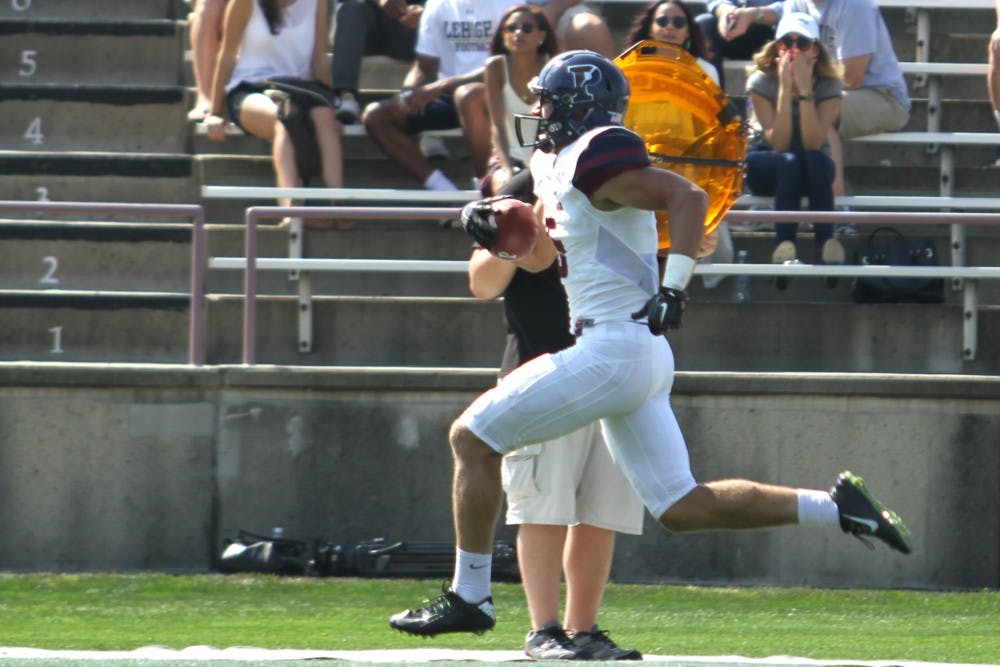
Sophomore wideout Justin Watson had a 78-yard touchdown reception for the Quakers on Saturday.
Credit: Ilana Wurman , Ilana Wurman, Ilana WurmanThey are what we thought they were.
Coming into its first game of the season, no one thought Penn football would be flawless. The team is coming off a disappointing 2-8 season and was picked to finish sixth in the Ivy League preseason media poll.
So when the Quakers struggled against Lehigh on Saturday, it wasn’t entirely surprising. The defense was unable to contain Lehigh junior quarterback Nick Shafnisky, and the offense found too many empty possessions in its short passing scheme.
As coach Ray Priore said, “One thing you can’t replicate when you go into the first game is the speed of your opponent.”
And that’s entirely fair. First games always bring jitters and no matter how hard coaches try to replicate it, there is no real substitute for game speed.
Then again, a lot of the team’s issues were the same ones we saw last year.
Dartmouth quarterback Dalyn Williams and Yale quarterback Morgan Roberts — both mobile gunslingers — gave Penn problems in 2014 and Shafnisky followed in their footsteps. Whether on designed runs or broken plays, Lehigh was able to gain consistent yardage and keep drives moving.
Meanwhile, Penn struggled to sustain its own possessions. The Quakers have been defined by their short passing game for the past year with varying degrees of success, but too often on third and fourth down, junior quarterback Alek Torgersen was only able to find open receivers well behind the markers. It’s tough to win ball games when three of your drives end on failed fourth down conversions and the team goes 3-for-10 on third down.
Penn doesn’t seem to have fixed all of the issues that made it one of the weakest Ivy League teams last season. The rest of its season — and the hope that the team can turn around under a new coaching staff — hinges on the team’s ability to grow and adapt.
In terms of growth, the Quakers seem to have had plenty of young players successfully transition into key roles on the team.
Wide receiver Justin Watson and running back Tre Solomon opened their sophomore campaigns with two of their best games as collegiate players. Watson had his first career 100-yard receiving game and came up with Penn’s biggest play of the day, a 74-yard sprint to the endzone off a short pass. Solomon didn’t seem to feel any of the consequences of his 2014 knee injury on the way to 120 total yards.
On defense, underclassmen stepped up in big ways. Freshman Nick Miller came up with an interception, Penn’s only forced turnover of the game, and sophomore Colton Moskal led the team in tackles with 11.
So after one game, the Red and Blue look like a similar team with new faces on the field and on the coaching staff. Their flaws were apparent, but not unsolvable. Priore and his coaching staff have their work cut out for them.
Working on a short week, it’s not as though we’ll see too much schematic change in Thursday’s game against Villanova. Past that, it’ll be interesting to see how Penn adapts.
Will the offense continue to revolve around the short passes to the flat that have defined the team throughout Torgersen’s tenure at quarterback? Can the defense successfully limit the mobile quarterbacks who dot Ivy League rosters?
Every team has challenges each and every season. One non-conference game isn’t going to define a season. But whether a team is able to adapt to the challenges it faces throughout the season certainly will.
The Daily Pennsylvanian is an independent, student-run newspaper. Please consider making a donation to support the coverage that shapes the University. Your generosity ensures a future of strong journalism at Penn.
DonatePlease note All comments are eligible for publication in The Daily Pennsylvanian.




